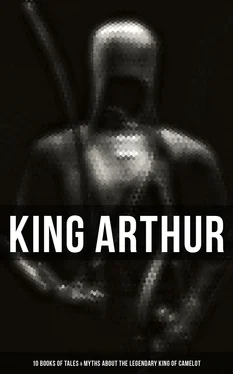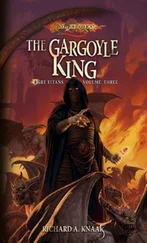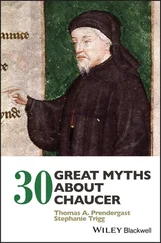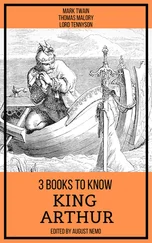Sir Lucan and Sir Bedivere went to the King where he lay, swooning from the blow, and bore him to a little chapel on the seashore. As they laid him on the ground, Sir Lucan fell dead beside the King, and Arthur, coming to himself, found but Sir Bedivere alive beside him.
So King Arthur lay wounded to the death, grieving, not that his end was come, but for the desolation of his kingdom and the loss of his good knights. And looking upon the body of Sir Lucan, he sighed and said: "Alas! true knight, dead for my sake! If I lived, I should ever grieve for thy death, but now mine own end draws nigh." Then, turning to Sir Bedivere, who stood sorrowing beside him, he said: "Leave weeping now, for the time is short and much to do. Hereafter shalt thou weep if thou wilt. But take now my sword Excalibur, hasten to the water side, and fling it into the deep. Then, watch what happens and bring me word thereof." "My Lord," said Sir Bedivere, "your command shall be obeyed"; and, taking the sword, he departed. But as he went on his way, he looked on the sword, how wondrously it was formed and the hilt all studded with precious stones; and, as he looked, he called to mind the marvel by which it had come into the King's keeping. For on a certain day, as Arthur walked on the shore of a great lake, there had appeared above the surface of the water a hand brandishing a sword. On the instant, the King had leaped into a boat, and, rowing into the lake, had got the sword and brought it back to land. Then he had seen how, on one side the blade, was written, "Keep me," but on the other, "Throw me away," and, sore perplexed, he had shown it to Merlin, the great wizard, who said: "Keep it now. The time for casting away has not yet come." Thinking on this, it seemed to Bedivere that no good, but harm, must come of obeying the King's word; so hiding the sword under a tree, he hastened back to the little chapel. Then said the King: "What saw'st thou?" "Sir," answered Bedivere, "I saw naught but the waves, heard naught but the wind." "That is untrue," said King Arthur; "I charge thee, as thou art true knight, go again and spare not to throw away the sword."
Sir Bedivere departed a second time, and his mind was to obey his lord; but when he took the sword in his hand, he thought: "Sin it is and shameful, to throw away so glorious a sword" Then, hiding it again, he hastened back to the King. "What saw'st thou?" said Sir Arthur. "Sir, I saw the water lap on the crags." Then spoke the King in great wrath: "Traitor and unkind! Twice hast thou betrayed me! Art dazzled by the splendour of the jewels, thou that, till now, hast ever been dear and true to me? Go yet again, but if thou fail me this time, I will arise and, with mine own hands, slay thee."
Then Sir Bedivere left the King and, that time, he took the sword quickly from the place where he had hidden it and, forbearing even to look upon it, he twisted the belt about it and flung it with all his force into the water. A wondrous sight he saw for, as the sword touched the water, a hand rose from out the deep, caught it, brandished it thrice, and drew it beneath the surface.
Sir Bedivere hastened back to the King and told him what he had seen. "It is well," said Arthur; "now, bear me to the water's edge; and hasten, I pray thee, for I have tarried overlong and my wound has taken cold." So Sir Bedivere raised the King on. his back and bore him tenderly to the lonely shore, where the lapping waves floated many an empty helmet and the fitful moonlight fell on the upturned faces of the dead. Scarce had they reached the shore when there hove in sight a barge, and on its deck stood three tall women, robed all in black and wearing crowns on their heads. "Place me in the barge," said the King, and softly Sir Bedivere lifted the King into it. And these three Queens wept sore over Arthur, and one took his head in her lap and chafed his hands, crying: "Alas! my brother, thou hast been overlong in coming and, I fear me, thy wound has taken cold." Then the barge began to move slowly from the land. When Sir Bedivere saw this, he lifted up his voice and cried with a bitter cry: "Ah! my Lord Arthur, thou art taken from me! And I, whither shall I go?" "Comfort thyself," said the King, "for in me is no comfort more. I pass to the Valley of Avilion, to heal me of my grievous wound. If thou seest me never again, pray for me."
So the barge floated away out of sight, and Sir Bedivere stood straining his eyes after it till it had vanished utterly. Then he turned him about and journeyed through the forest until, at daybreak, he reached a hermitage. Entering it, he prayed the holy hermit that he might abide with him, and there he spent the rest of his life in prayer and holy exercise.
But of King Arthur is no more known. Some men, indeed, say that he is not dead, but abides in the happy Valley of Avilion until such time as his country's need is sorest, when he shall come again and deliver it. Others say that, of a truth, he is dead, and that, in the far West, his tomb may be seen, and written on it these words:
"Here lies Arthur, once King and King to be"
Table of Contents Table of Contents King Arthur – An Introduction King Arthur – An Introduction Table of Contents Le Morte d'Arthur Le Morte d'Arthur Table of Contents The Legends of King Arthur and His Knights King Arthur & His Knights The Story of King Arthur and His Knights The Story of the Champions of the Round Table The Story of Sir Launcelot and His Companions Idylls of the King Sir Gawain and the Green Knight The Mabinogion Myths and Legends of the Celtic Race
Sir Thomas Malory’s Book of King Arthur and of his Noble Knights of the Round Table
Table of Contents Table of Contents King Arthur – An Introduction King Arthur – An Introduction Table of Contents Le Morte d'Arthur Le Morte d'Arthur Table of Contents The Legends of King Arthur and His Knights King Arthur & His Knights The Story of King Arthur and His Knights The Story of the Champions of the Round Table The Story of Sir Launcelot and His Companions Idylls of the King Sir Gawain and the Green Knight The Mabinogion Myths and Legends of the Celtic Race
Preface
The Table or Rubrysshe of the Content of Chapters
Book I
Book II
Book III
Book IV
Book V
Book VI
Book VII
Book VIII
Book IX
Book X
Book XI
Book XII
Book XIII
Book XIV
Book XV
Book XVI
Book XVII
Book XVIII
Book XIX
Book XX
Book XXI
Table of Contents
After that I had accomplished and finished divers histories, as well of contemplation as of other historial and worldly acts of great conquerors and princes, and also certain books of ensamples and doctrine, many noble and divers gentlemen of this realm of England came and demanded me many and oft times, wherefore that I have not do made and imprint the noble history of the Saint Greal, and of the most renowned Christian king, first and chief of the three best Christian, and worthy, King Arthur, which ought most to be remembered among us Englishmen tofore all other Christian kings; for it is notoyrly known through the universal world, that there be nine worthy and the best that ever were, that is to wit, three Paynims, three Jews, and three Christian men. As for the Paynims, they were tofore the Incarnation of Christ, which were named, the first Hector of Troy, of whom the history is comen both in ballad and in prose, the second Alexander the Great, and the third Julius Caesar, Emperor of Rome, of whom the histories be well known and had. And as for the three Jews, which also were tofore the incarnation of our Lord, of whom the first was duke Joshua which brought the children of Israel into the land of behest, the second David king of Jerusalem, and the third Judas Machabeus, of these three the Bible rehearseth all their noble histories and acts. And since the said Incarnation have been three noble Christian men, stalled and admitted through the universal world into the number of the nine best and worthy. Of whom was first the noble Arthur, whose noble acts I purpose to write in this present book here following. The second was Charlemain, or Charles the Great, of whom the history is had in many places, both in French and in English. And the third and last was Godfrey of Boloine, of whose acts and life I made a book unto the excellent prince and king of noble memory, King Edward the Fourth.
Читать дальше












